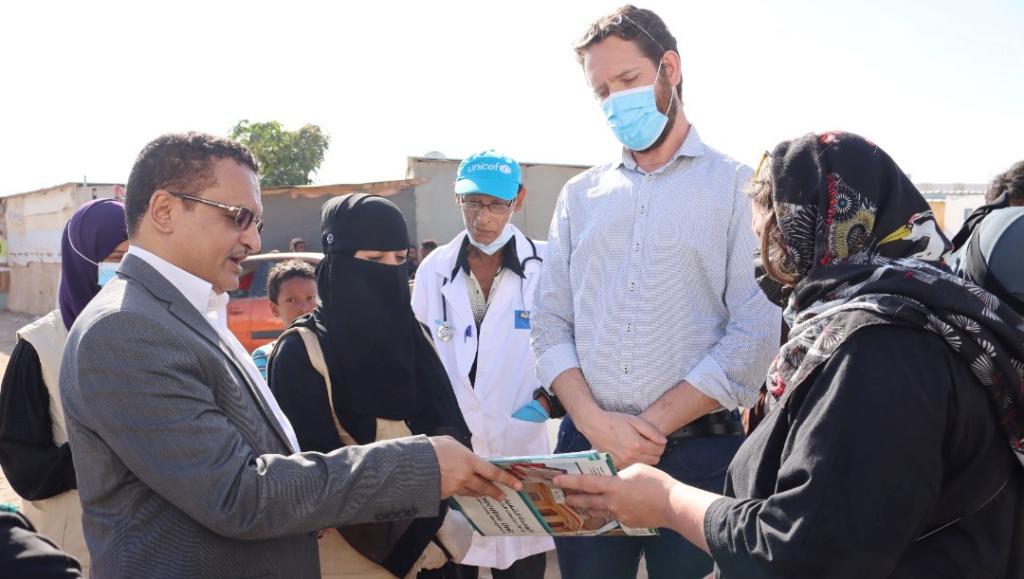Al-Sadee: humanitarian file is in priorities government, and we seek sustainable solutions for displaced persons

Mr. Nageeb Abdulrahman Al-Sadee, head of the Executive Unit of IDP Camps Management has stressed that the humanitarian file is in the priorities of the political leadership and the government. He has warned of the risks of exacerbating the humanitarian crisis of the IDPs in Yemen in terms of their dire needs, due to the lack of support provided by funders, and the lack of work transparency executed by international organizations.
In a statement to the media, he clarified that the humanitarian crisis in Yemen has been described as the greatest man-made humanitarian crisis in our time. There are currently “4280000” displaced persons, including “3,068,000” living in the liberated areas. This means that there are 13% of the population of Yemen uprooted. Moreover, there was a similar number of IDPs who were displaced and then they returned to their areas, which lack minimum services. In addition, such areas of return lack education and health facilities, and are still heavily laced with landmines. Unfortunately, they also did not receive any support since 2015.
Mr. Al-Sadee pointed out that “2,500,000” IDPs live in houses, not in camps, but they do not receive adequate services. He stressed that the Executive Unit is working as much as possible to secure the IDP camps from evictions previously experienced by displaced persons.
The head of the Executive Unit explained that there are currently “638 camps and “878” residential gatherings where IDPs live in rental houses.
He added that displacement has caused problems like the pressure on services, which are weak, in host communities. For instance, the original population of the City of Marib is (371,000) while the number of displaced persons is (2,200,000), which is seven times the present population of Marib. This has further exacerbated the humanitarian crisis. Furthermore, international organizations have been working for eight years according to the emergency plan and have not moved to sustainable support projects.
Mr. Al-Sadee stressed that the Executive Unit is currently working on having sustainable and income-generating projects. In addition, international organizations must work according to real partnerships with the government side, if we really want to alleviate the humanitarian crisis. He added that the State institutions concerned with providing services to citizens in general must return.
Regarding housing projects for displaced persons, Mr. Al-Sadee stressed that simple housing projects provided by our Kuwaiti brothers for the IDPs in Al-Khukhah District, Al Hodeidah Governorate have been launched. We thank them for such support and hope that it will continue in coordination with the competent government agencies in order to plan such projects.
Concerning the efforts of the Executive Unit to find durable solutions for displaced persons, Mr. Al-Sadee explained that sustainable solutions should be planned which are represented by:
– Intergrading IDPs in the areas where they are located,
– Returning IDPs to their areas of origin or other areas,
– Taking IDPs’ opinion on either returning or staying in host communities
He addressed the most prominent challenges facing the work of the Executive Unit, which are represented by the scarcity of resources, especially as the world and international organizations have begun to divert their attention from Yemen to other countries and regions. This has led to a decrease in the humanitarian support, especially from the brothers in the Arab coalition; of course, they have their logical justifications. They provided international organizations with great support throughout the past period, but in reality, there is nothing concrete. This makes international organizations face moral responsibilities to work in full transparency and coordination with the competent government agencies.
Al-Sadee called on all supporting bodies and donor organizations to provide more support and assistance to our country and in turn to intensify the work of monitoring and supervision of the work of international organizations. He explained that the situation is tragic as the camps suffer from a lack of food allocations and other NFIs.”
He added, “one of the important problems is also the mismatching of data and statistics between the Executive Unit and international organizations. This issue constitutes an imbalance that must be solved”. In this regard, he reaffirmed that our hands are outstretched and our offices are open to international organizations, especially OCHA, which is concerned with correcting IDPs statistics.
On the plans for the upcoming stage, he stressed that the government, represented by His Excellency Prime Minister, Maeen Abdulmalik , and the political leadership have a strong orientation towards paying attention to the humanitarian file and the development of humanitarian work in line with the requirements of the stage.
Mr Al-Sadee clarified that this topic has gained special importance of the President of the Presidential Leadership Council and the Prime Minister. This means that the file of displaced persons is at the top of the priorities of the tasks of the political leadership and the government at the next stage, God willing.”
Written by: Abdusalam Hayel,
Photographed by: Zaki Al-Yousfi.
